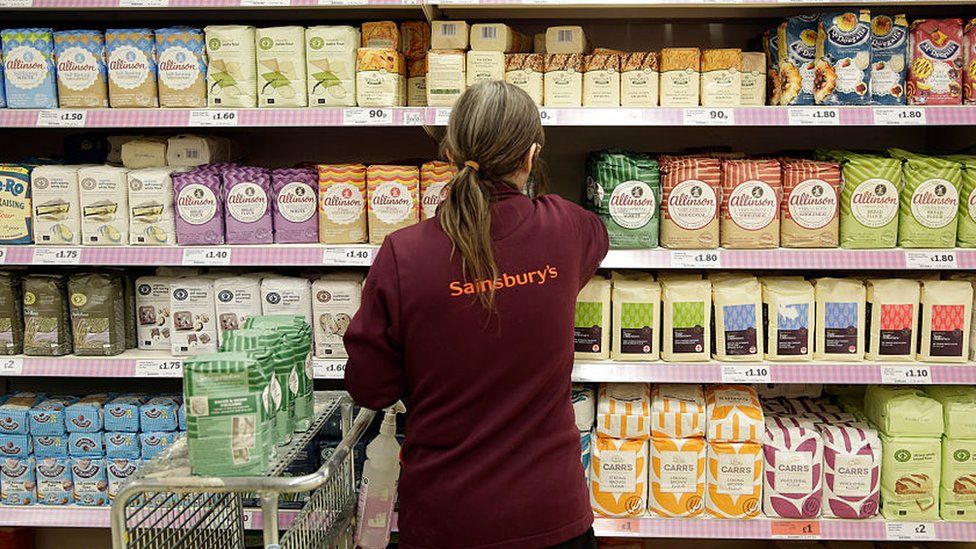Sainsbury’s increases pay as supermarkets battle for staff
- Published
- comments

Sainsbury's has announced pay rises from March as supermarkets continue their battle to retain workers.
It will increase minimum pay for employees outside London to £12 an hour, with wages for staff in the capital increasing to £13.15 an hour.
The increase means all of its workers will be paid the voluntary Real Living Wage, which is higher than the compulsory National Living Wage.
About 120,000 staff will benefit from the increase, Sainsbury's said.
Sainsbury's workers outside London are currently paid £11 an hour, while those in London receive £11.95 an hour.
With the National Living Wage, often referred to as the minimum wage, set to rise to £11.44 an hour in April 2024 - and for the first time including 21 and 22-year-olds - Sainsbury's decision will mean its workers earn 56p more per hour than the government minimum wage.
Workers will also benefit from the increase a month earlier than the official rate comes into effect.
The pay deal comes exactly a year after Sainsbury's gave its staff a pay bump to £11 an hour, partly in response to other supermarkets increasing wages.
Since March last year, Aldi has paid its staff £11.40 an hour outside London and £12.85 inside the capital, while Britain's biggest grocer Tesco has been paying workers £11.02 an hour outside London since April and £11.95 in the capital.
But the supermarkets will need to increase worker wages at least in line with the new minimum wage when it comes into effect this April.
Worker wages in the UK on average have only recently begun outpacing inflation - the rate at which prices rise.
Inflation is currently at 3.9%, the lowest rate for more than two years, but still almost double the Bank of England's target of 2%.
Simon Roberts, the chief executive of Sainsbury's, said: "Our colleagues do a brilliant job delivering for our customers every day and at the same time they are continuing to face the rising costs of living."
Bally Auluk, national officer at the shop workers' union Usdaw, added the rise represented an "inflation-busting pay award of over 9%".
"The current cost of living is still on the rise, which is why Usdaw are very pleased the business has taken this on board during our consultations," he added.
But while employees welcome higher pay packets, some businesses see it as another hit to their margins, when running costs remain high.
Kate Nicholls, chief executive of the industry body UK Hospitality, said when the government announced the minimum wage rise last year it served as "a reminder that although government announces it, it is businesses who deliver it and why it is so vital other action is taken to reduce tax and costs, particularly [business] rates".
Lord Wolfson, chief executive of Next, said after the company's trading update on Thursday that its prices for customers "would've been moving down" if it had not been for its wage bill rising.
However, the retail giant did say it expects its profits to be some £960m in 2024.
- Published24 October 2023